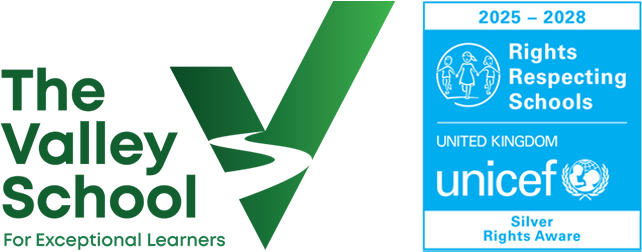Any curriculum enquiries can be directed to:
Mrs Wharton – Assistant Headteacher
Email: catherine.wharton@thevalley.herts.sch.uk
Curriculum Intent
What is The Valley aiming to achieve through its curriculum?
- To provide an outstanding education, which is personalised to the needs of each student
- To provide a calm, learning focused environment, which is safe, caring and nurturing
- To provide a holistic education, which incorporates guidance and strategies from support agency partnerships e.g. speech and language therapists, occupational therapists etc.
- To increase resilience and develop students’ ability to self-regulate
- To ensure The Valley Values are at the heart of learning, these include:
- To develop students’ essential life skills, developing their knowledge and the ‘cultural capital’ they need to succeed in life (personal development)
- To promote physical and emotional well-being
- To prepare students for the next stage of their education
- To ensure all students leave The Valley School with outcomes that reflect their potential.
- To ensure that all students receive an education that is in line with the statutory guidance outlined in the SEND Code of Practice 0-25
Implementation
How is The Valley School’s curriculum delivered?
Curriculum Delivery
- Students have full access to a broad and balanced curriculum including the National Curriculum which is adapted and differentiated to meet students’ learning needs and styles.
- Our curriculum is designed to be challenging and appropriate to the student’s stage of development.
- Our curriculum offers significant cross-curricula learning opportunities to ensure students make significant personal development.
- Our curriculum covers a wide range of core and foundation subjects.
- Our KS3 curriculum is a thematic-based curriculum which offers children access to teaching that challenges and supports them to make excellent progress, but that is presented in a way best suited to the individual.
- Our KS4 curriculum provides opportunities for students to attain a range of accreditations appropriate to their abilities alongside the acquisition of essential life skills.
Wider Strategies
- Our curriculum is designed to build and expand on previous skills and subject knowledge over a five year period. The curriculum is a spiral, offering regular opportunities for repetition to embed knowledge, increasing the students’ ability to recall information.
- The Valley School offers a wide range of qualifications, which are selected to appropriately challenge students, based on their stage of development.
- We offer curriculum time to students in Year 11 to attend a weekly college link, developing appropriate work experience opportunities for students in Key Stage 4.
- Literacy and numeracy are promoted across the school in all subjects. Specialist interventions in small groups are used to further support individual students to ensure maximum progress.
- We provide additional extra-curricular activities at lunchtime and after school. Access to these are facilitated by offering transport home, where possible, at the end of the day.
‘The curriculum allows pupils to develop their interests and talents, as well as study a range of subjects from the national curriculum.’ OFSTED Dec ‘24
Teaching and Learning
- Our students are taught in a primary model in Key Stage 3 with core learning delivered by primary trained teachers. Other subjects are delivered by subject specialists.
- In Key Stage 4 students are taught by subject specialists.
- Our staff are well qualified and hold a range of qualifications. Staff are provided with a wide variety of CPD opportunities to remain up to date with subject pedagogy and knowledge. They are also encouraged to visit other settings to experience good practice.
- Teaching staff are encouraged to deliver practical and well adapted lessons which enable students to develop their knowledge and apply this knowledge in practical situations as skills.
- Students are broadly grouped by ability and will follow a subject specific curriculum which is informal, semi-formal or formal according to the level of learning which they are able to access.
- The curriculum is adapted and differentiated with an ethos of ‘different for different’; with learning based upon the students’ individual needs and level of competence.
- When a student is required to remain off school for three or more days, (but is well enough to learn), the school initiates home learning. This may be a short or long term plan depending on the individual needs and ensures students continue to receive a full curriculum if unable to physically attend.
Curriculum – Executive Summary
We strive to be a warm and caring centre of excellence, providing a safe and supportive environment for secondary school children with learning needs.
A place of safety, security and happiness where:
- Every student will make good progress
- Every lesson every day is good or better
- High quality CPD is provided for all staff
- 360 degree wrap around care is provided for students and their families
These are designed to ensure that The Valley School adds value to students’ lives. Based on teacher standards and social and emotional development, staff and students
Cultural Capital
We define Cultural Capital as the accumulation of knowledge, behaviours and skills that a student can draw upon and which demonstrates their cultural awareness, knowledge and competence. We work tirelessly to build our students’ aspirations and expose them to a range of experiences to help them achieve their goals.
We recognise that students need to be given rich and sustained opportunities to develop their cultural capital and we do this in many ways, for example, through our curriculum, extra-curricular activities, trips and visits.
There are six key areas of development that are interrelated and contribute to building a student’s cultural capital: personal, social, physical, spiritual, moral and cultural. At The Valley School we ensure our students are supported to be the best they can be within our ever changing, diverse and eclectic society.
‘The school’s wider development of pupils is excellent.’ OFSTED Dec ‘24
Assessment
- Both the academic and the social and emotional learning of each student is carefully monitored throughout their time at The Valley School.
- Checks on progress take place formally at set intervals through the year and informally throughout the school day.
- Analysis of progress data shows that student underperformance is rare, but addressed where found.
- Assessment opportunities adhere to the following format:
-
- Staff at The Valley continuously analyse data from a range of sources to effectively evaluate each student’s performance. This allows us to determine whole school performance, moderate our own practice and plan for further improvement.
- Students’ bespoke academic ‘Flight Path’ is used to track the progress of the learner and determine expected outcomes from different starting points.
- Our assessment mapping highlights the range of accreditations available and how they relate to each other.
- Staff use a range of formative and summative assessment procedures to assess academic progress and attainment.
- A social and emotional assessment tool is used to measure personal growth, which compliments academic progress.
Impact
How does The Valley’s curriculum add value to our students?
- Assessment data shows that the majority of our students meet or exceed their expected progress.
- Assessment data shows that the majority of our students meet or exceed their expected outcomes in Year 11.
- Subject leaders are responsible for the monitoring of the teaching of their subjects across the school. They are provided with meeting time and support to quality control the consistency and effectiveness of delivery and subject content.
- When students transition from The Valley in Year 11, they leave with externally accredited qualifications that reflect their individual potential.
- On leaving The Valley in Year 11 all students have been prepared for their transition to post 16 learning. All students are supported within school and through external agencies to ensure they access appropriate destinations.
- Detailed analysis of outcomes and student progress indicate that there is no statistical significance between the performances of key groups.
- The spiritual, moral, social and cultural development of students is at least good, with many outstanding features.
- Students develop learning behaviours and self-regulatory practices over their time at the Valley School
- Data shows that we add value in students’ social and emotional development.
‘The careers program, preparation for adulthood and transition support are exceptional.’ OFSTED Dec ‘24




